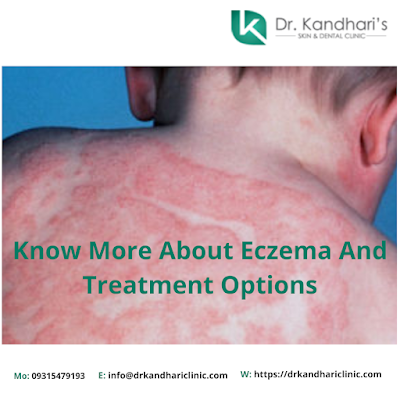Dr. Rajat Kandhari, a dermatologist at Dr. Kandhari's Skin and Dental Clinic, the Best Skin Specialist Clinic in Delhi, shares, 'Eczema is defined as itchy, dry, rough, chapped, flakey, inflamed, and irritated skin. Other symptoms may include severe itching, red or brownish-gray patches, small, raised bumps that ooze fluid when scratched, crumbly patches of dried yellowish ooze, which can signal secondary infection, and also causes thickened and scaly skin". Hence, this condition must be addressed immediately with the help of a skin doctor.
What Causes Eczema?
1. Atopic eczema: Atopic eczema is most commonly seen in children and is also related to allergic asthma. It is characterized by a red, itchy, and sometimes weepy rash. It is a chronic condition that can flare up badly and may also become infected.
2. Seborrhoeic eczema: Seborrhoeic eczema is mainly caused by a naturally occurring yeast, Malassezia, on the skin. On the scalp, seborrhoeic eczema signs include redness, scaling, or dandruff.
3. Contact allergic eczema: Contact allergic eczema is caused by an allergic reaction to a chemical that comes into contact with the skin. The most common cause of these allergies is skin contact with metals like nickel, fragrant perfumes, chemical preservatives in cosmetic products, and medications.
4. Discoid eczema: Discoid eczema is caused by chronic stress and a reaction to staphylococci bacterial antigen, which is common in adults. It causes very itchy and weepy patches of inflamed skin and affects the entire body.
5. Asteotic eczema: Asteotic eczema is most common in elderly patients with dry skin and a tendency to chap. It is distinguished by superficial red cracks and dry skin.
6. Varicose eczema: Varicose eczema primarily affects the lower legs. It is caused by low blood circulation and leakiness of some of the valves in the lower leg veins.
Dr. Rajat Kandhari is an expert skin doctor in Delhi, and he offers the best eczema treatment using the most advanced approaches. Read on to learn more about the treatment options and lifestyle modifications that help manage eczema.
Treatment For Eczema:
Topical corticosteroidTopical corticosteroids are anti-inflammatory medications that should alleviate
eczema symptoms such as inflammation and itchiness. Cortisone creams and ointments can help to get rid of
itching and scaling. Low-power steroids like hydrocortisone are available without a prescription.
When the skin is less able to protect against irritants and allergens, eczema occurs. Dry, scaly, rough, irritated skin, redness, and itching are some of the common
symptoms of eczema.
Eczema can be caused by a combination of factors such as dry skin, genes,
and an immune system problem. Corticosteroid solutions, gels,
creams, and ointments made with hydrocortisone steroids can relieve itching and
help reduce inflammation.
Oral medicationsOral medications like systemic corticosteroids or immunosuppressants are prescribed.
Immunosuppressants are suggested medications that prevent the immune system from overreacting.
This prevents flare-ups of eczema.
Antibiotics: If eczema occurs alongside a bacterial skin infection, doctors prescribe antibiotics.
Antihistamines:
Oral over-the-counter (OTC) antihistamines may relieve itching.
They work by inhibiting histamine, which is the trigger of allergic reactions.
Topical calcineurin inhibitorTopical calcineurin inhibitors suppress immune system activity.
It helps in relieving inflammation and preventing flares.
Emollients:The emollient acts as a barrier and provides much-needed moisture to the skin,
calming the red, itchy skin. Emollients are available as lotions, ointments, and creams.
PhototherapyPhototherapy, or light therapy, uses ultraviolet light or sunlamps to help prevent immune system responses that trigger eczema.
This procedure can manage moderate dermatitis. A doctor will monitor the skin closely during the treatment.
It needs a sequence of treatments and can help diminish or clear up eczema.
Lifestyle Modifications For Managing Eczema:
Lifestyle modifications such as reducing stress and improving sleep can reduce the possibility of an eczema flare-up.
Avoid annoyances like rough fabrics, harsh soaps, and detergents.
Cool weather can also dry out the skin and activate flare-ups. People with atopic dermatitis must avoid scratching.
To prevent damaging the skin, it can help to rub instead of scratching the areas that are itchy.
Since dry skin can trigger an eczema flare-up, a dermatologist recommends an ointment or cream-based moisturizer that will help soothe the skin.
Steps That Help In Managing Eczema Symptoms To Reduce Skin Irritation Are:
Avoid scratching the skin. This can make the irritation from atopic dermatitis substandard.
Wear loose-fitting, cotton-blend clothes that allow air to pass freely to the skin and are the most comfortable for those with atopic dermatitis.
After bathing or taking a shower, gently pat the skin dry with a towel rather than rubbing the skin.
Keep fingernails short and smooth to help prevent damage as a consequence of scratching.
Leftover chlorine or bromine on the skin after swimming in a pool may be annoying.
After swimming, take a quick shower or bath immediately,
washing with a mild cleanser all over the entire body, and then putting on an appropriate moisturizer on eczema-affected areas.
If one is experiencing the symptoms of eczema, they can get this skin concern managed with the advanced treatment options offered by
Dr. Rajat Kandhari at Best Skin Specialist Clinic in Delhi.
